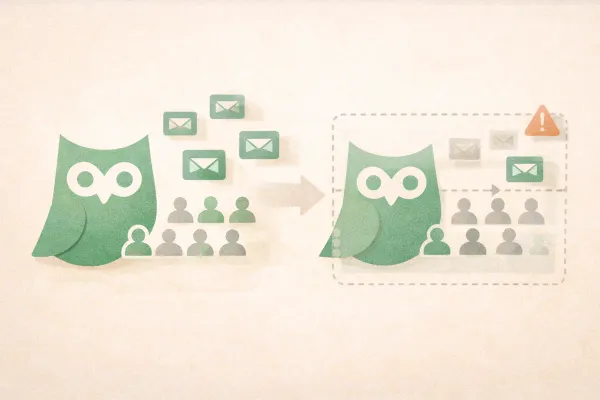Best Constant Contact Alternatives for Small Businesses (2026)
Compare 7 Constant Contact alternatives for small businesses. Honest pricing, nonprofit discounts, and practical recommendations.

Last updated: February 2026
TL;DR: Constant Contact's pricing starts reasonable but escalates quickly — and the nonprofit discount requires annual prepayment. For small businesses wanting simpler email without the complexity, Groupmail offers the best balance of simplicity, human support, and value at $29/month with managed delivery included. MailerLite is ideal if you want affordable automation. Brevo wins for multi-channel communication on a budget.
Constant Contact has been in the email space for decades, but many small businesses find themselves paying more than necessary for features they don't use. The Standard plan at $35/month quickly adds up, and the most useful features are locked behind higher tiers. If you're reconsidering your options, here are seven alternatives worth evaluating.
Disclosure: We're the team behind Groupmail — simple email software for organizations since 1996. We'll be upfront about where we fit and honest about alternatives.
Why Do Small Businesses Look for Constant Contact Alternatives?
Most businesses switch because Constant Contact's pricing grows faster than the value they receive — especially small businesses and nonprofits that need simple email, not a full marketing suite.
Constant Contact's Lite plan starts at $12/month, but the Standard plan where most useful features live costs $35/month. For small businesses with modest needs — sending a weekly newsletter or monthly update — that's a significant annual expense for capabilities they may never touch.
The nonprofit discount structure also frustrates many organizations. Constant Contact offers 20% off with 6-month prepayment or 30% off with annual prepayment. Compare that to alternatives offering flat discounts with no prepay requirement. For a deeper look at the real costs, see our Constant Contact pricing for nonprofits breakdown.
💡 Tip: Before switching, list what you actually use in Constant Contact. Most small businesses need a simple editor, contact management, basic analytics, and reliable delivery. Everything else is a bonus you may never touch.
What Should You Look for in a Constant Contact Alternative?
Focus on pricing transparency, ease of use, reliable delivery, and support that actually responds — not feature count or marketing buzzwords.
The biggest trap when switching email tools is upgrading to something equally complex. If you're leaving Constant Contact because it's more than you need, avoid replacing it with another all-in-one marketing platform.
According to Neon One's Nonprofit Email Report, nonprofit email open rates average around 28% and click-through rates hover near 2.5%. These metrics come from sending relevant content to engaged lists — not from sophisticated automation or AI-powered features. The fundamentals matter more than the feature list.
What Are the 7 Best Constant Contact Alternatives for Small Businesses?
Groupmail leads on simplicity and value, MailerLite wins on affordable automation, and Brevo offers the strongest multi-channel capabilities — each serving different needs.
| Tool | Best For | Free Plan | Starting Price | Nonprofit Discount |
|---|---|---|---|---|
| Groupmail | Simplicity + human support | 500 contacts | $29/mo | 30% |
| MailerLite | Affordable automation | 500 subscribers | $10/mo | 30% |
| Brevo | Multi-channel on a budget | 300 emails/day | $9/mo | 15% (Enterprise) |
| Mailchimp | Maximum integrations | 500 contacts | $13/mo | 15% |
| EmailOctopus | Budget basics | 2,500 subscribers | $9/mo | 20% |
| ConvertKit | Content creators | 1,000 subscribers | $25/mo | None |
| GetResponse | Webinar hosts | 500 contacts | $19/mo | 50% (via program) |
1. Groupmail
Best for: Small businesses wanting simplicity with human support Pricing: Free (500 contacts, 2,500 emails/month) | Starter $29/mo | Standard $49/mo | Growth $79/mo | 30% nonprofit discount Website: groupmail.io
Groupmail was built for organizations that need to communicate with their people — not run multi-channel marketing operations. The interface strips away the complexity that makes platforms like Constant Contact overwhelming for small businesses, letting you send your first update within 10 minutes of signing up.
Groupmail manages email delivery on all plans. You sign up, import your contacts, and send. No DNS configuration, no connecting third-party services, no technical setup required. For small businesses where the newsletter duty might pass between different team members, this simplicity matters. Organizations on the Growth plan ($79/month) who want more control over delivery can optionally connect their own email service (BYOSMTP), but it's entirely optional.
The human support stands out. When you contact Groupmail, you reach actual people who respond promptly — not a chatbot. According to Capterra reviews, users consistently rate Groupmail 4.3/5 with praise for responsive support and ease of use.
At $29/month for the Starter plan (up to 5,000 contacts), Groupmail costs less than Constant Contact's Standard plan ($35/month) while covering more contacts. The 30% nonprofit discount requires no prepayment — unlike Constant Contact's prepay-only discount structure. The company has operated continuously since 1996, a 30-year track record that provides reassurance.
Pricing last verified February 2026. Visit groupmail.io/pricing for current rates.
What's missing: Groupmail doesn't offer sophisticated automation workflows, event management tools, or hundreds of integrations. The template library is smaller than Constant Contact's. These are deliberate trade-offs — Groupmail focuses on doing simple email well.
Key Takeaway: Groupmail is the best choice for small businesses that value simplicity and human support over feature count. The straightforward pricing and 30% nonprofit discount (no prepay) make it a clear upgrade from Constant Contact's pricing model.
2. MailerLite
Best for: Small businesses wanting automation on a budget Pricing: Free (500 subscribers, 12,000 emails/month) | Growing Business $10/mo | Advanced $20/mo | 30% nonprofit discount Website: mailerlite.com
MailerLite offers one of the best combinations of affordability and features available. The drag-and-drop editor is genuinely intuitive — consistently rated among the easiest interfaces in the category, with a 4.7/5 rating on Capterra.
The free plan supports 500 subscribers with 12,000 emails per month and includes automation — something Constant Contact doesn't offer at any free tier (they have no free plan at all). Paid plans start at just $10/month, making it significantly cheaper than Constant Contact across all list sizes. MailerLite also offers a 30% nonprofit discount.
According to EmailToolTester's deliverability analysis, MailerLite consistently performs well on inbox placement, earning a "Best of 5" award with a 94% average across multiple test rounds. The platform also includes a website builder and landing pages on paid plans.
What's missing: The approval process for new accounts can be strict. Customer support is email-only on the free plan. The free plan includes MailerLite branding on emails. More business-oriented than organization-focused — you'll see "subscribers" rather than "members" throughout.
3. Brevo (formerly Sendinblue)
Best for: Multi-channel communication on a budget Pricing: Free (300 emails/day, unlimited contacts) | Starter $9/mo | Business $18/mo | 15% nonprofit discount (Enterprise only) Website: brevo.com
Brevo charges by emails sent rather than contacts stored — a model that benefits businesses with large contact lists but moderate sending frequency. The free plan allows unlimited contacts with 300 emails per day (about 9,000/month).
What makes Brevo a strong Constant Contact alternative is the built-in CRM and multi-channel capabilities. You get email, SMS, and WhatsApp messaging from one platform. According to G2 reviews, Brevo holds a 4.5/5 rating with users praising the value for money.
For businesses currently paying Constant Contact's $35/month Standard plan, Brevo's $18/month Business plan delivers comparable features with more channels included.
What's missing: The nonprofit discount (15%) only applies to Enterprise plans — most small businesses won't qualify. The email editor is functional but less polished than MailerLite's. Some users report slower support response times. Free plan emails include Brevo branding.
4. Mailchimp
Best for: Businesses needing maximum integrations Pricing: Free (500 contacts, 1,000 sends) | Essentials $13/mo | Standard $60/mo | 15% nonprofit discount Website: mailchimp.com
Mailchimp remains the most recognized name in email with over 300 integrations. If your business depends on connecting email to other tools — CRM, e-commerce, accounting — Mailchimp's integration library is hard to match. According to Capterra, it holds a 4.5/5 rating with over 16,000 reviews.
The challenge is cost. Mailchimp's Standard plan starts at $60/month for 2,500 contacts — significantly more than Constant Contact's equivalent. The free plan dropped to 500 contacts and 1,000 sends, and automation was removed from free tiers in June 2025. For more on this, see our guide on Mailchimp's free plan changes.
What's missing: The free plan is too restrictive for most growing businesses. Costs escalate quickly with list growth. Phone support is limited to Premium plans ($350/month). The 15% nonprofit discount is lower than most alternatives offer.
Simple Email for Your Business
Send updates to your customers without the marketing complexity.
Set up in 10 minutes. No credit card required.
Trusted since 1996 · Human support · 30% nonprofit discount
5. EmailOctopus
Best for: Budget-conscious businesses with larger contact lists Pricing: Free (2,500 subscribers, 10,000 emails/month) | Pro $9/mo | 20% nonprofit discount Website: emailoctopus.com
EmailOctopus stands out with the most generous free plan on this list: 2,500 subscribers and 10,000 emails monthly. For a small business that just needs to send a monthly newsletter, you might never need to pay.
The platform keeps things intentionally simple. No CRM, no landing page builder, no SMS marketing — just clean email with basic automation. According to GetApp reviews, EmailOctopus holds a 4.8/5 rating, with users praising the simplicity and value.
At 10,000 subscribers, you're looking at about $44.50/month with the nonprofit discount — significantly cheaper than Constant Contact's equivalent pricing.
What's missing: Fewer templates and less design flexibility than Constant Contact. No phone support. Limited advanced segmentation. The simplicity that's a strength for some is a limitation for businesses wanting more sophisticated tools.
6. ConvertKit (Kit)
Best for: Content creators and solopreneurs Pricing: Free (1,000 subscribers, limited features) | Creator $25/mo | Creator Pro $50/mo Website: convertkit.com
ConvertKit is purpose-built for bloggers, podcasters, and course creators. The standout features — paid newsletter subscriptions, digital product sales, and the Creator Network — serve a specific audience that Constant Contact doesn't target well.
According to G2, ConvertKit holds a 4.4/5 rating. The visual automation builder is strong, and ConvertKit claims a 99.8% delivery rate — though this measures server acceptance, not inbox placement. The free plan supports 1,000 subscribers, though it restricts automation access.
What's missing: No nonprofit discount. At $25/month for 1,000 subscribers, it's expensive for basic newsletter needs. The editor is intentionally minimal — great for text newsletters, limiting for designed emails. Not built for businesses sending updates to customers.
7. GetResponse
Best for: Businesses that host webinars Pricing: Free (500 contacts, 2,500 sends) | Email Marketing $19/mo | Marketing Automation $59/mo | 50% nonprofit discount (via program) Website: getresponse.com
GetResponse differentiates itself with a built-in webinar platform — unique among email tools. For businesses where webinars drive leads, this eliminates the cost of a separate webinar service.
According to G2, GetResponse holds a 4.3/5 rating. The free plan supports 500 contacts with 2,500 sends per month. The 50% nonprofit discount (available through their dedicated program) is among the most generous available.
What's missing: The Marketing Automation plan at $59/month is where the best features live — putting it in Constant Contact's price range. The free plan is limited. The interface has many options, which can feel overwhelming for businesses wanting simplicity.
Which Tool Is Right for Your Business?
Groupmail is the best default for small businesses leaving Constant Contact — choose alternatives only when you have a specific need Groupmail doesn't serve.
Replacing Constant Contact for simple updates: Groupmail. Simpler interface, lower price ($29/mo vs $35/mo), better nonprofit discount (30% with no prepay vs 20-30% with prepay required).
Need automation on a budget: MailerLite. Starting at $10/month with automation included on the free plan.
Need multi-channel (email + SMS): Brevo. Send-based pricing saves money for businesses with large lists and modest sending volume.
Need maximum integrations: Mailchimp. 300+ integrations, but expect higher costs.
Need the most generous free plan: EmailOctopus. 2,500 subscribers free — hard to beat on budget.
Content creator or solopreneur: ConvertKit. Built for monetizing audiences.
Run webinars regularly: GetResponse. Built-in webinar platform saves a separate subscription.
FAQ
What's the cheapest Constant Contact alternative? Brevo and EmailOctopus both start at $9/month on paid plans. EmailOctopus has the most generous free plan at 2,500 subscribers. Groupmail's free plan covers 500 contacts with 2,500 emails/month and managed delivery included.
Does Constant Contact offer a nonprofit discount? Yes — 20% off with 6-month prepayment or 30% off with 12-month prepayment on Standard plans and above. A 50% discount is available through TechSoup. Groupmail offers 30% off all paid plans with no prepayment required.
Can I migrate from Constant Contact easily? Yes. Export your contacts as a CSV from Constant Contact, then import to your new platform. Most migrations take under an hour for the technical steps. Budget 2-4 weeks for your new sending reputation to establish. For a step-by-step guide, see our how to switch from Mailchimp guide — the process is similar for Constant Contact.
Is Constant Contact worth the price? For businesses using event management or needing phone support, Constant Contact's pricing may be justified. For businesses sending straightforward newsletters and updates, alternatives like Groupmail ($29/month) and MailerLite ($10/month) deliver comparable results at lower cost.
What features do small businesses actually need from email software? Focus on five essentials: reliable email delivery, simple list management, an editor you can use without training, basic open and click analytics, and support that responds. According to HubSpot's marketing research, segmented emails drive 30% more opens — basic segmentation helps, but sophisticated automation is overkill for most small businesses.
Do I need SMTP integration or managed sending? Most small businesses are better served by managed sending — the platform handles delivery so you don't have to configure anything. Groupmail manages delivery on all plans. BYOSMTP (connecting your own email service) is useful for larger organizations wanting more control, but it's not necessary for most businesses.
Conclusion
Constant Contact built its reputation as a reliable email platform, and it still serves businesses that need event management or phone support. But for small businesses focused on sending straightforward updates and newsletters, the pricing and complexity are hard to justify when simpler, more affordable alternatives exist.
Ready to send your first update? Start free with Groupmail — set up in 10 minutes, no credit card required. Built for organizations, not marketers.




